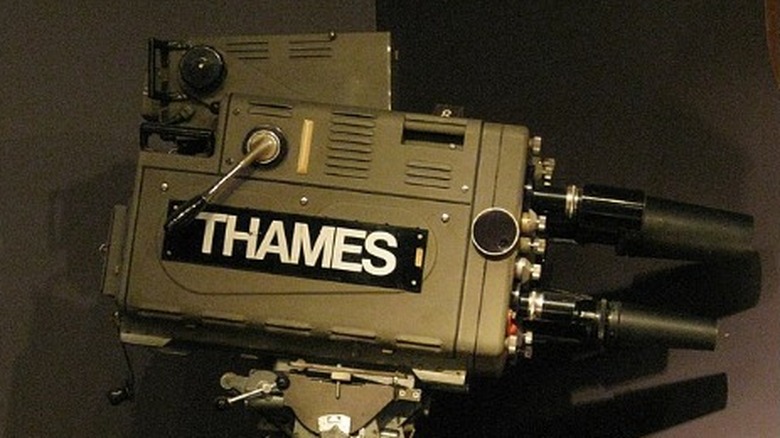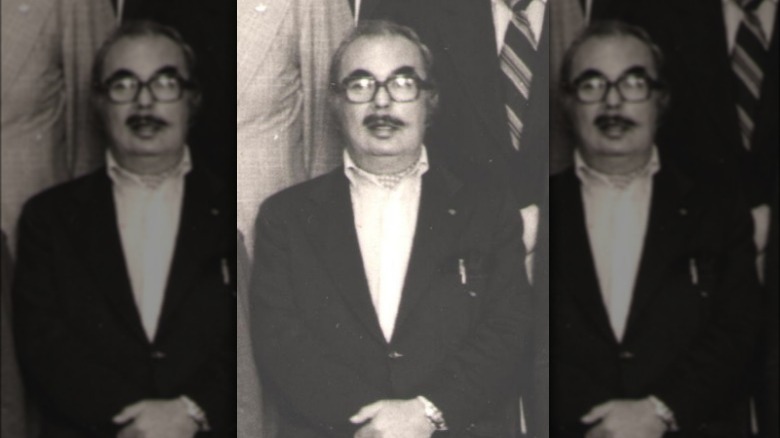The Tragic 1958 Death Of Actor Gareth Jones During A Live Television Broadcast
These days, we've grown accustomed to binge-watching our favorite TV dramas on streaming services like Netflix and Hulu. In the early days of TV, though, both in the U.K. and in the U.S., most terrestrial TV dramas were broadcast live, according to the British Film Institute (BFI) website, Screen Online. Anymore, truly live TV is mostly the domain of sporting events, local news broadcasts, and the long-running sketch comedy show Saturday Night Live (SNL). Even then, SNL's only broadcast live on the East Coast. For these reasons and more, live TV dramas have become a rare breed, indeed.
A lot like live theater, a live TV broadcast carries with it risks and limitations in terms of performance and production quality. Should an actor or actress make a mistake on live television, then the director can't simply yell "Cut!" like they might in a typical film or TV production. Nor can any production or performance blemish in a live broadcast be ironed out in editing. What if something were to truly go wrong, though, and an actor or actress was hurt — or, worse, killed — live on the air? According to The Guardian, that's exactly what happened in 1958 to actor Gareth Jones on the long-running live British TV show "Armchair Theatre" (via IMDb).
Gareth Jones holds a Guinness World Record
Gareth Jones was born in Wales in 1925, according to his biography posted on IMDb. These days, he's most known for the dubious honor of being the first actor to ever die on live TV, according to Guinness World Records. As the site British Television Drama (by British film and TV lecturer at the University of Stirling David Rolinson) notes, there's some discrepancy regarding Jones' exact birthdate. Some contemporary reports put him as old as 35 when he died in 1958, yet others claim he was 32, and some accounts from actors who knew him said he was only in his 20s. There are similarly varied accounts of what happened on the day of Jones' sudden death in the middle of a live TV production.
There's also disagreement over whether Jones was a particularly notable actor. Still, nonetheless, he graduated from the Central School of Dramatic Arts and began working in London's world-famous theater district, the West End. From there, Jones found himself employed as an actor in live TV, and in "Armchair Theatre" specifically, which debuted in 1956 and was on the air in one form or another until 1974 (via IMDb). An anthology series produced at first by the Associated British Corporation (ABC), "Armchair Theatre" featured live TV broadcasts of single plays. Later on, it was produced by "Thames Television," a subsidiary of ITV, according to the Thames TV website.
Jones felt unwell in the middle of the live broadcast
As British Television Drama goes on to note, the "Armchair Theatre" play that Jones had a part in was called "Underground," which was about a group of people in the London subway system when an above-ground nuclear explosion traps them beneath the earth. The live broadcast of "Underground" would transmit from the ABC studios in Manchester on November 30, 1958, after only a few days of rehearsal. The character Jones was set to play was named Carl Norman, and when the play was in the middle of its live broadcast, Jones reported feeling unwell. One account of what happened said Jones claimed to feel sick while in make-up between scenes and took a nip of brandy to calm his nerves before he then passed out in his seat.
When actors reached a point in the play when Jones was set to appear he was nowhere to be found. Actor Peter Bowles, who also starred in "Underground," remembered what happened next, offering a somewhat different version of events (via The Guardian). "During transmission, a little group of us was talking on camera while awaiting the arrival of Gareth Jones's character, who had some information for us. We could see him coming up towards us, but we saw him fall ... We had no idea what had happened, but he certainly wasn't coming our way. The actors started making up lines, 'I'm sure if so-and-so were here he would say ... " Bowles said.
The actors learned something had happened to Jones between the first and second act
Though most say Jones lost consciousness and died from a heart attack while in makeup, Bowles is the only account that remembers seeing Jones approach before falling, as British Television Drama explains. Either way, what is known for certain is that Jones was attended to by a doctor on hand should just such an accident happen during live production, and the other actors in "Underground" only learned that something was wrong between the first and second act. In true show business fashion, the production crew decided to plow on with the live broadcast, improvising around Jones' absence before news quickly spread that Jones was dead.
As the play's producer Sydney Newman (pictured) later recalled, "The actors were incredible, especially Andrew Cruickshank," who was the play's villain, Newman said. Cruickshank's main speech depended on questions thrown at him by the now absent actor, such as, "'How are you going to lead us?'" Newman continued. "Cruickshank, paraphrasing Gareth's question, ad-libbed, 'Now, you might ask, how am I going to lead you?' and then followed it with his own set speech," Newman said.
Around that same time, another near-fatal accident happened in a live British TV production when a defibrillator was accidentally turned on, based on further reporting from The Guardian. Through those hard lessons, British TV moved away from live broadcasts entirely until 2009, when the independent U.K. TV producer Sky TV announced an experimental return of the format.



